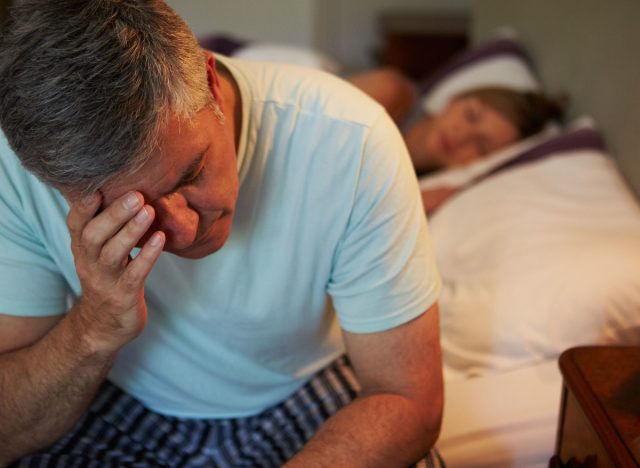This One Cause Of Abdominal Fat Will Shock You, New Study Reveals

So many individuals struggle with unwanted belly fat. It's very common to diet and include certain vigorous exercises that are directed primarily on the mid-section for weight loss in that area, but disappointingly, many times this fat accumulation continues to be quite a frustrating and unhealthy issue. If this sounds all too familiar, listen up, because you may be overlooking one significant cause of abdominal fat that will likely surprise you. Read on to learn more, and next, check out The 6 Best Exercises for Strong and Toned Arms in 2022, Trainer Says.
Insufficient sleep can cause more harm than you initially thought

A new study performed by Mayo Clinic, published in The Journal of the American College of Cardiology, reveals that insufficient sleep has been proven to increase your calorie intake, resulting in fat accumulation—specifically unhealthy belly fat.
According to principal investigator of the Mayo Clinc study, Virend Somers, M.D., Ph.D., the Alice Sheets Marriott Professor of Cardiovascular Medicine, "The inadequate sleep appears to redirect fat to the more dangerous visceral compartment. Importantly, although during recovery sleep there was a decrease in calorie intake and weight, visceral fat continued to increase. This suggests that inadequate sleep is a previously unrecognized trigger for visceral fat deposition, and that catch-up sleep, at least in the short term, does not reverse the visceral fat accumulation."
If you didn't already know, visceral fat is the fat that wraps around your internal organs deep within your abdomen. It's known to have a strong connection to metabolic and cardiac diseases.
Related: Speed Up Belly Fat Loss In Your 40s With These Floor Exercises, Trainer Says
If you're having trouble sleeping, you're not alone

If you deal with the inability to get a sufficient amount of sleep, you're not alone. In fact, according to a study performed by the Centers for Disease Control and Prevention, 1 out of 3 adults in the U.S. aren't getting enough good sleep on the daily. So many factors can contribute to this lack of Z's, including stress, too much work and difficult hours, or even financial issues.
This insufficient sleep is not good. As Dr. Somers explains, "Our findings show that shortened sleep, even in young, healthy and relatively lean subjects, is associated with an increase in calorie intake, a very small increase in weight, and a significant increase in fat accumulation inside the belly." (The CDC also says this lack of good quality sleep could lead to a higher risk of developing high blood pressure, diabetes, stroke, and heart disease.)
Related: Secret Exercise Tricks To Shrink Abdominal Fat Fast, Trainer Says
Study participants who had restricted sleep consumed 300 more daily calories than the control group

The analysis for the Mayo Clinic study, run by cardiovascular medicine researcher Naima Covassin, Ph.D. at Mayo Clinic, involved the observation of 12 healthy, non-obese individuals. Those studied participants took turns in two 21-day sessions. One session was considered "normal sleep," and the other, "restricted sleep." Scientists observed each individual, recording energy expenditure (everyone's stayed relatively level throughout the study), energy intake (both groups could freely access food), body weight and composition, and distribution of fat. This included belly fat, or visceral fat.
Both sessions started their first four days with nine hours in bed to sleep. Then it switched up to four hours of sleep for the restricted sleep group and nine hours of sleep for the controlled group. The last three days included nine hours in bed for both groups. There were 300 more calories eaten each day during restricted sleep sessions, 13% more protein, and 17% additional fat. The extra calories were higher at the first stage of sleep deprivation and lower towards the "recovery period."
This research reveals that lack of sleep is a major contributor to unhealthy abdominal fat

The research reveals that a lack of sleep can greatly contribute to unhealthy abdominal fat. When not able to sleep sufficiently, you're more inclined to consume extra calories, and you are not physically active, which puts you at risk for chronic conditions. According to Dr. Covassin, "The visceral fat accumulation was only detected by CT scan and would otherwise have been missed, especially since the increase in weight was quite modest—only about a pound. Measures of weight alone would be falsely reassuring in terms of the health consequences of inadequate sleep. Also concerning are the potential effects of repeated periods of inadequate sleep in terms of progressive and cumulative increases in visceral fat over several years."
So now what? Well, trying to get sufficient sleep in a schedule that works for your lifestyle is key. Dr. Somers advises those individuals who can't get that solid chunk of sleep to maintain a diet complete with healthy food choices. Additionally, increased exercise is imperative.









